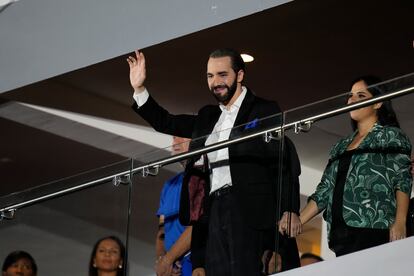El Salvador’s Nayib Bukele registers for reelection despite constitutional objections
The Constitutional Chamber of the country’s Supreme Court, handpicked by his supporters in congress, ruled in 2021 that his candidacy for reelection was permitted and ordered the electoral court to allow it

El Salvador President Nayib Bukele registered for reelection in next year’s contest, his party announced Monday, despite objections from legal experts and opposition figures who say the country’s constitution prohibits his candidacy.
Bukele’s New Ideas party announced his registration and that of Vice President Félix Ulloa via Twitter Monday. “New Ideas are invincible,” the party wrote.
Bukele is popular in El Salvador but considered controversial internationally. He announced in September that he planned to seek a second five-year term. That came after the Constitutional Chamber of the Supreme Court, handpicked by his supporters in congress, ruled in 2021 that his candidacy for reelection was permitted and ordered the electoral court to allow it.
Constitutional lawyers, however, have maintained that Bukele’s candidacy would violate at least four articles of the constitution, including article 154, which states: “The presidential term will be five years and will begin and end on June 1, without the person who has held the presidency being able to continue in their functions even one more day.”
Lawyer Eduardo Escobar, of the civic group Citizens’ Action, said “Bukele has no right to reelection. If he does that, it’s against the constitution.”
Rubén Zamora, of the opposition group Citizens’ Resistance, said “the president’s party is tapping him to run again, even though the constitution says that is prohibited.”
While constitutional bans on reelection were once common in Latin America — where some countries have a history of “caudillo” strongmen perpetuating themselves in power — those term limits have been removed, overturned or ignored in a number of cases, including Honduras, Nicaragua, Venezuela and Bolivia.
Bukele, who maintains approval ratings above 80%, has led a crackdown on the country’s powerful street gangs that has landed more than 60,000 people in jail on suspicion of gang ties.
Despite suspending some fundamental rights for more than a year, the measures have been widely popular. Communities that lived under the constant extortion and violence of the gangs are returning to life.
Sign up for our weekly newsletter to get more English-language news coverage from EL PAÍS USA Edition
Tu suscripción se está usando en otro dispositivo
¿Quieres añadir otro usuario a tu suscripción?
Si continúas leyendo en este dispositivo, no se podrá leer en el otro.
FlechaTu suscripción se está usando en otro dispositivo y solo puedes acceder a EL PAÍS desde un dispositivo a la vez.
Si quieres compartir tu cuenta, cambia tu suscripción a la modalidad Premium, así podrás añadir otro usuario. Cada uno accederá con su propia cuenta de email, lo que os permitirá personalizar vuestra experiencia en EL PAÍS.
¿Tienes una suscripción de empresa? Accede aquí para contratar más cuentas.
En el caso de no saber quién está usando tu cuenta, te recomendamos cambiar tu contraseña aquí.
Si decides continuar compartiendo tu cuenta, este mensaje se mostrará en tu dispositivo y en el de la otra persona que está usando tu cuenta de forma indefinida, afectando a tu experiencia de lectura. Puedes consultar aquí los términos y condiciones de la suscripción digital.








































